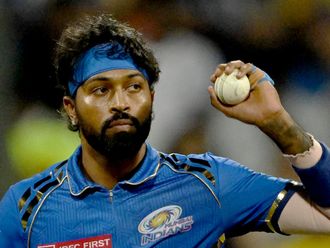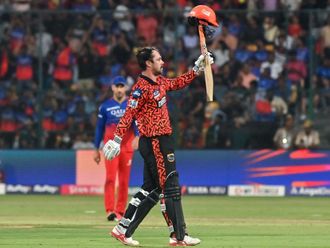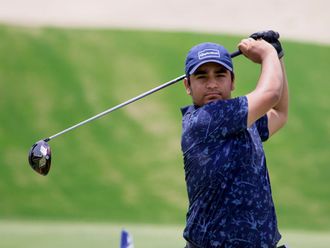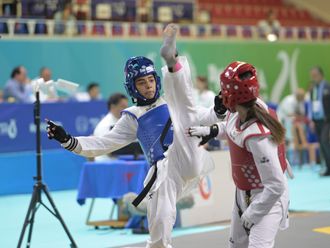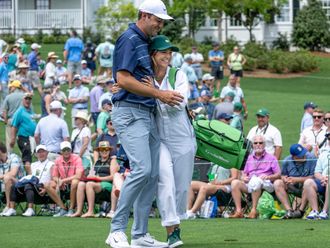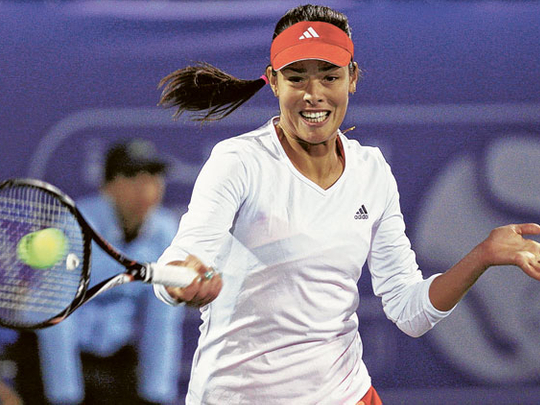
The question is simple: tennis or life? There was, or what seemed to be, a tinkle that sliced through the air: a sound that emanates when two champagne flutes, made of the finest crystal, meet in a toast.
The few inches of empty space between the interviewer and interviewee is sprinkled by that sound. In truth it was a giggle that escaped from Ana Ivanovic's mouth, but the reverberation from it was precious.
"I think it's life," said Ivanovic, "Because it is something that you have. Being healthy, having great people around you. That's important and something that I value a lot. My family has always been my biggest support and without them I wouldn't be here. That is one part of my life, a big part. It shaped my being basically. The people around you know your character and when all this wears out you can have a normal existence and raise your kids normally."
Ivanovic is nothing if not pragmatic about her current state. She has tasted fame, climbed the dizzying heights of it and breathed in the rarified air. She has also flirted outrageously with the fates and lost.
Perhaps, it is because of this that she is so engaging. Many young professional players of her ilk on the WTA Tour have had their lives spun and doctored into setting outrageously high goals, in order to live up to the expectations of their families, the fans, the media, the sponsors and lastly themselves.
Ivanovic — a former world No 1 who won her first grand slam at 21 in 2008 — gamely carries on today just trying to win the next match she plays in from one tournament to another.
In sporting parlance, such a phenomenon is simply referred to as ‘going to work'. But it is a lot more than that for a top-flight athlete whose potential and talent outshone her performances. It is a search for that one important missing link that puts the pieces of the puzzle back together again.
Andre Agassi went through that phase after striding across the world of tennis like a colossus. He still had lucrative contracts - just like Ivanovic right now - and his own private jet, but he flew in it to play Challengers because his ranking simply wasn't good enough to get him into main draws anymore. In the end, the confidence is tempered by humility and an outlook that is realistic.
It's not as if she is wallowing in the depths of women's tennis. Ivanovic's current ranking - 18 - may be modest and proportionate with her on-court earnings - $140,323 for the year to February 20 - but she's not struggling to pay her bills.
Gifted with angelic looks, a persona which radiates simplicity and an ability to speak intelligently, she is an advertiser's dream, but not because she's just a pretty face. Ana is real, she is human and she is not synthetic. Forbes endorsed these qualities when they had her high on their list of rich female athletes with an off court income in excess of $7 million, last year.
In Ana's world, however, those assets are subsidiary. She is battling to make a testimony as a tennis player of note and this struggle is being enacted week in and week out, from one country to another, on the courts. It is the means to an end and the Dubai Tennis Championships is part of that schedule.
"I really hope I am on my way back," she confessed. "It has been a very tough two years. I was taking things for granted. At first everything seemed easy, I was winning a lot of matches and getting a lot of success, but now I have learnt to appreciate the good times, because in your career there are always going to be ups and downs no matter what you do. What is important is how you deal with the downs and I feel that because of this I am more experienced as a player."
Mind over matter
The history of tennis is rich with the stories of players who have served evidence of their outrageous talent, only to find their careers slowly and steadily coming apart. Ivanovic is familiar with the tales of fellow Serbs Jelena Dokic and Jelena Jankovic, who is currently battling her own demons, and she is determined not to become a statistic. Breakdowns happen for a variety of reasons: some are technical, others can be mental Ivanovic is smart enough to recognise that sometimes it can be a combination of both factors.
"When you lose a few matches, doubts begin to creep into your mind,' she said. "It is all about finding that fine balance. My game wasn't matching my mental state and sometimes it was vice versa, so it was a combination of both forces that made me slip. I think that if you want to be at the top in professional sports, then all the essentials have to be married to each other."
Which means that staying at the top is more difficult than the process of actually getting there? "It is, definitely," she agreed, adding: "When I got the No. 1 ranking I felt that someone had placed a bulls eye on my back - everyone wants to beat you and that's a challenging thing. This was a new experience for me and it was unfortunate that I had a few injuries to cope with at that time.
"So I took a few breaks and then, when I returned, I faced a couple of tough losses which, in turn, played with my mind because up to that point I was only winning, or fighting my way out of tough situations. Then I suddenly found myself at the top and I wasn't prepared for it."
Fortunately for her, Ivanovic adopts a workmanlike approach to her craft. She knows that she can be a diva and, judging by the reception she gets on the court and off it, it would not be out of place for her to attain that mindset, but she knows that it does not pay to constantly pander to the expectations of others.
"Expectations are always there," she said. ‘Even I have expectations from myself and I see myself as one player and the player I can't be - people keep saying that I am coming back, but it's their opinion and I have tried to do the best thing that I can possibly do."
So now it's all down to the basics: being happy about her game and optimistic about her prospects. "Even when I was struggling I still had the best intentions in my heart and it just wasn't working. I wasn't finding the right balance and the right people, so you know it's very important to get up and keep going as long as you have the belief that you can achieve what you have set out to achieve," she said.
For the most part, Ivanovic has discovered the root of her problems - it is paralysis by analysis.
"I am stubborn and determined," she said, smiling. ‘I am very emotional and I can cry easily and that's why I have some big highs and very big lows, so it can work for you or even against you."
It's not just about the tennis, however. There is the constant fight not to give in to the gravitational pull of the glitz and allure of the women's tour, the fact that there is ‘another' Ana Ivanovic who the sponsors, the agents and the marketing men pay top dollar to see unleashed. Ivanovic is not hot property because of her tennis and this is surprising.
On closer inspection, when weighing up the amount of substance that is packed into that slim, lithe, tall figure - that inspires people to buy everything from watches to sporting goods and even the fruit juices that she endorses - one is forced to concede that she has got style and style never goes out of fashion.
What Ivanovic has done is immerse herself in her tennis and walk down the road less travelled. She has shown that she has character - coupled with beauty - and this can command an enormous price tag and increase the value of her equity. Companies who respect these ethics, because it reflects their own core values, understand it better than most: prior to the Dubai Tennis Championships, tournament owners Dubai Duty Free recognised her potency and signed her on as their Global Brand Ambassador.
"It's important to understand that you have to dedicate time to your sponsors, to have relationships with the people and the media, but it is also hard when you are first coming up and your primary focus is on tennis," said Ivanovic philosophically.
"Suddenly you find that there are all the other commitments that you have to do and it's not only time consuming, but also tiring, physically and mentally. You have to apply yourself, which you are not used to doing, so that's the first thing one has to learn. You have to accept that all this is a part of it and manage it in the best possible way."
Valuing her privacy
Having worked out the pros and cons of fame and the price that it can extort, Ivanovic is aware that the initial hunger for craving recognition is replaced with an urgent need for privacy when fame, accompanied by an entourage of extra baggage, comes knocking.
"The grass is always greener on the other side," she said. "You always want something that you don't have. That's the story of everyone's life. I have never really found myself comfortable in that kind of limelight. I like to have my privacy. I don't like people knowing what I do in my free time. I am also a very shy person, but I understand that people want to know more. It's all about the fine balance and accepting things as they are, because if you don't accept it and fight it then it gets you down."
Currently ranked at No. 18 on the WTA Tour, Ivanovic hovers around the top 10 on talent alone. This is why she does not subscribe to the view that someone can be popular simply by being a good player.
"It's one thing to achieve big things in your career and it's another to be the kind of person that you are, because in the end that's what you are left with," she stated. "Fame and success and titles stay with you, but they wear out eventually. In the end all that you are left with is your character. I think through this sport we see different characters — I see players like Roger [Federer] and Rafa [Rafael Nadal] and they show so much respect for each other, the game and everything in it. They are so much above what they have achieved and that's a great value to have."
This is why people cannot help but notice that through her period of trial and tribulations — and those days are far from over — Ivanovic has coped with grace and even developed her own unique personality. "I really just try to enjoy the game and hope that I can inspire young kids. I started playing tennis because of Monica Seles and I try to promote the sport in the best possible way. Sometimes it's hard because you get upset on court, but I think in life one learns through experiences in order to evolve as a person.
"We are constantly learning and, when that's not the case, we stop believing. It's important to learn from every experience - some are unpleasant, but that's one thing that I have learnt: not everything is great."
Though she may still be a work in progress there is a school of thought that subscribes to the view that, when her schooling is complete Ivanovic she will be remembered for being a decent, honest and straight-talking tennis professional and, in most cases, perhaps smarter than we all think.
"When I got to No. 1, I found that everything was a struggle. You realise that you have to make choices and you can't have everything at the same time. I think it's important then to be happy with yourself and what you have and work yourself to be the best around it. It's challenging, but then that's also the beauty of it," she explained.
Channelling the intensity, that's the key to Ivanovic's game plan. Those who can deal with failure can also be classified as winners. The process helps to strengthen their character and then they are tougher than most.
Ivanovic's conversion from champion to tragedienne may not happen simply because today she is far more popular and happy on so many levels than she was when at the peak of her career.
As far as progression goes, one could do a lot worse.


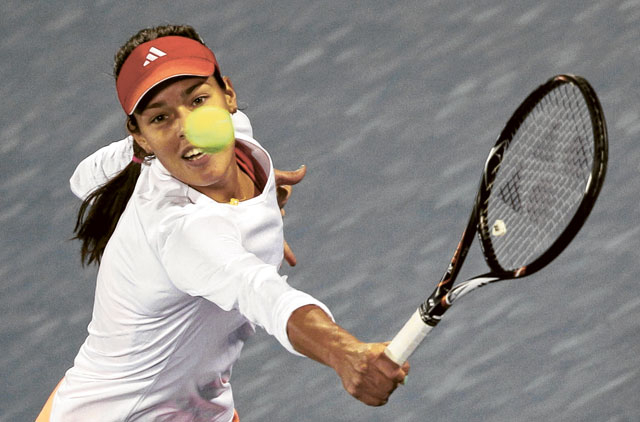
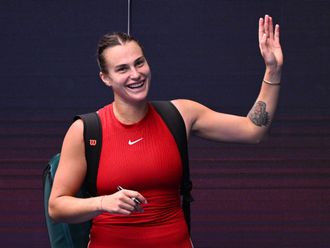
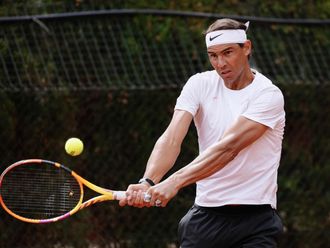
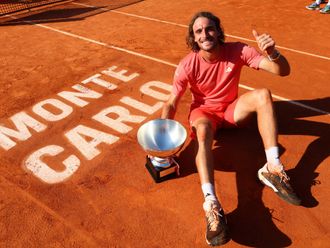
![Copy of 920889-01-02 [1]-1713093032070](https://imagevars.gulfnews.com/2024/04/14/Copy-of-920889-01-02--1--1713093032070_18edc4d3895_small.jpg)
